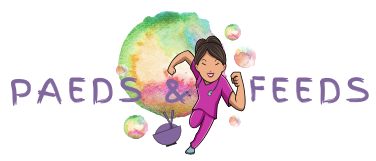G’day to all you Paeds & Feeders out there!
Today I wanted to type up a quick article about melatonin. I talk frequently to parents in clinic about this medication and over the last few years it has grown exponentially in popularity.
Sleep problems in children are common and so it stands to reason that medications like melatonin would become popular to use in certain situations. So why do we need to know about this medication before we use it? I think the reason is because we can then use this medication as a very useful tool to achieve good sleep, without necessarily becoming reliant on it forever.
So before we even consider using melatonin, it is important to have a good understanding of what normal sleep patterns are for kids. Click here to read an article I wrote about this earlier: https://kids-health.guru/children-and-normal-sleep-patterns/
So many parents that I see in clinic, and so many of my friends who are parents struggle with their children’s sleep (or lack thereof). This is an epic problem because SLEEP AFFECTS EVERYTHING. I’ve said it before and I’ll say it again, if you don’t establish good sleep hygiene you have a snowball’s chance in hell getting your child to sleep through the night, or to fall asleep within a reasonable time frame. Sleep hygiene is not just for children – it is important for adults too. Here is a link to a quick refresher on “Sleep hygiene” and an article about strategies to actually manage (and eliminate) your child’s sleep problems: https://kids-health.guru/sleep-problems/
So… you’ve managed to achieve pristine sleep hygiene for your kids. You’ve done what you can to be rid of “bad” sleep associations and set some firm boundaries (and enforced them) around bedtime and your child repeatedly getting up after “lights out.” But you still feel like you are pushing water uphill. Your child is staying in bed, but lying awake for 2 hours before being able to fall asleep. What now?
Well let’s have a little chat about a hormone called MELATONIN.
Melatonin is a hormone that makes you feel sleepy and it is produced by a little gland located somewhere in the middle of your brain called the ‘pineal gland.’ The way that this “sleep-inducing system” works is that during the day, bright light from the sun shines into your eyes and creates a nerve impulse that travels down your optic nerve (the nerve that runs to your brain from the back of each of your eyes) and acts on the pineal gland to INHIBIT the production of melatonin.
As the sun goes down at the end of the day, your eyes register the falling levels of light and this means melatonin production is no longer inhibited. About an hour after the sun goes down, there is a surge in the level of melatonin produced by the pineal gland. This in turn, makes you sleepy and then you go to bed and sleep.
Now… if melatonin is as magically sleep inducing as this, why then do so many children (and adults) have troubles falling asleep?
WELL… there are a number of reasons why this might be so, but by far the most common reason is SCREEN TIME before bed. The light from electronic/electrical devices such as computer screens, TV, smart phones, tablet computers and the like, TRICK THE BRAIN into thinking that it is daytime! This means that the screen-light (just like sunlight) acts to inhibit the body’s natural production of melatonin.
The studies have shown beyond doubt, that screen time (in the 2-3 hours before bed) significantly delays sleep onset time in both children and adults. Excessive screen time also affects the quality and duration of your sleep.
I totally would provide you with the references for these articles, but it is 9pm and I have already worked 38 hours this week, so I’m going to let you do that literature search yourselves 😉
So THIS is one reason why I keep harping on about the importance of establishing good sleep hygiene. If you don’t, the melatonin might work… but you will probably rely on it forever.
Ideally, if I resort to using melatonin, I like to use it as a short term intervention. Used every day for a period of about 2 weeks, about 30-60 minutes before bedtime, used in conjunction with the institution of a good bedtime routine. After this I aim to withdraw it in the hope that the established routine (including a notable paucity of screen time) is enough to have rectified the problem!
Melatonin in Australia is only available on prescription. There is only one brand of melatonin available and it is a sustained release formulation. This means that it is made to be released over a long period of time. The advantage of this is that it will not only treat sleep ONSET problems (where children have troubles falling asleep) but potentially also sleep MAINTENANCE problems (like when they wake up multiple times through the night). To take advantage of this longer-lasting effect however, the tablets need to be swallowed whole.
Many children cannot swallow tablets whole, and in these cases the tablets can be crushed (and given in yoghurt/ice-cream/honey), or compounded by a pharmacist into an oral solution (and I have heard in some cases even “gummies”) but the medication will then be “immediate release” – meaning that it will only be effective for sleep onset problems.
Melatonin on the whole is a well tolerated medication with few side effects. Probably the most common one reported in my experience is vivid dreams and nightmares. Other commonly reported side effects are drowsiness, depressed mood, irritability, stomach pain, headache or dizziness. It is not addictive.
The starting dose (and any subsequent increases) should be determined by your doctor.
So I have talked about how my ideal situation is to use melatonin only SHORT TERM, and in the vast majority of cases, this should work well. There are however a few situations where melatonin might be used differently.
In the case of a long haul flight, melatonin can be used to help children sleep and overcome jetlag.
In cases of children with cortical blindness (where rising and falling light levels cannot help a child to suppress or produce melatonin) and in many children with Attention Deficit Hyperactivity Disorder (ADHD) and indeed Autistic Spectrum Disorder (ASD), disturbance of the normal sleep (circadian) rhythm is common and often quite impairing. Many parents will describe their children as poor sleepers with a history of struggling with bedtime from as early as when the child was an infant. It is in these cases that we often see longer term use of melatonin instituted. This should never be done however, unless supervised by a treating doctor.
…And now it is 10pm, and I am ready to throw in the towel (after having had a full day of clinic today also!). I sincerely hope that some of you out there have found this article useful. PLEASE don’t forget to leave me a comment, a like and/or a share so I can feel like my effort of staying up tonight was worth it!
Until next time, stay well and try to get some sleep!
xxDr Megs

